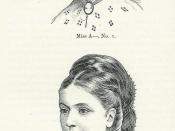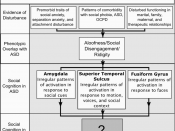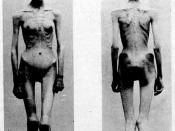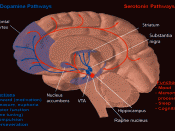CLAIM: Anorexia has affected thousand of equestrian riders through out the U.S. but the difference is, no one is willing to admit it. When a person falls victim to anorexia, they feel that is their responsibility to be perfect. There is a relationship between anorexia and perfectionism, the extent of perfectionism is directly associated with anorexia. Anorexia nervosa affects about 8 million Americans, while 7 million of them are women. They all try to hide it and make everyone assume that they are just naturally skinny. They deny the facts and claim that they don't see a problem but there really is a problem. "No one has woken up yet and said "ÃÂThis needs to stop'"ÃÂ REASONS -judges are scoring primarily on the appearance of the rider rather then the skill, "looking elegant often seems to mean looking thin"ÃÂ MAIN EVIDANCE -Shelly was 12-years-old, 71 pounds. She couldn't get out of bed because she was too weak.
Her liver and kidneys were failing and all of this because she wanted to be the smallest and because the people in her riding classes thought she looked like the "perfect petite rider."ÃÂ -incidents of anorexia, bulimia, and binge eating within the group has risen noticeable over the past 10 years -"thinner is better"ÃÂ culture -Karry Davis, nine months pregnant- has battled with anorexia for eight years- riding show in a month and a half ad needs to fit into her riding clothes, she told readers that she would be willing to do anything to get back to her normal weight again, and she will once she has her baby.
-one girl entered a college horse show and lost so she went to ask the judges what she should work on and they told her, "You have nice equitation, but you'll never win seriously unless you lose five pounds,"ÃÂ The student was 5'10, 130 pounds.
-a former judge claimed that he would "absolutely take points from a heavier rider if two people were equally skilled in the competition -Claire and her friends spent their winters in Florida riding during the day, puking, taking diet pills and endless diuretics at night. Diuretics are chemical substances that help to rid the body of excess fluids. They do this by forcing the kidneys to excrete urine mire frequently. Diet pills target the region of the brain responsible for the sensation of hunger. They trick the brain into thinking the stomach is full. Most diet pills contain caffeine. What these athletes are failing to see is that they are only harming their bodies more then they are helping them. There will be long tem affects and these riders are only worried about one thing and that is being perfect rather then how much damage they are actually doing to themselves.
-One rider dies because the disorder affected her strength and her bones were brittle. She ended up suffering a fall and died.
-the kids idolize their trainers therefore if they were willing to talk openly about these eating disorders, the kids would understand that it is a problem that's out there and stop trying to deny that facts.
OPPOSING VIEWS Many people through out this article tried to deny that there was really a problem but I think that these people are simply in denial and don't want to admit something as horrible as this. It would be a shame to their society. They try to blame it on others like one girl states "I think eating disorders might be a problem with the younger riders, but not others."ÃÂ Another rider said he didn't think eating disorders were a big problem among the equestrians.
-Shelly stated that "she walks around hearing denials of eating disorders all the time among horseback riders. It's simply something that these people do not want to admit to themselves or the world.
-I feel that the author's argument was very affective. She gave very good reasons for why she feels that eating disorders are a very big problem among equestrians. She gave personal stories that really lead me to believe the obvious. These girls need to get help and they need to start by confiding in their trainers.
ENDING: They need to realize that they are not perfect, that can't be perfect because life's not perfect. They should be happy with the body that have regardless of what judges or trainers or even their own peers think.





